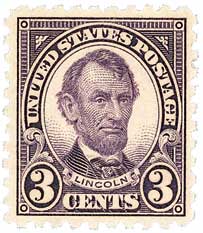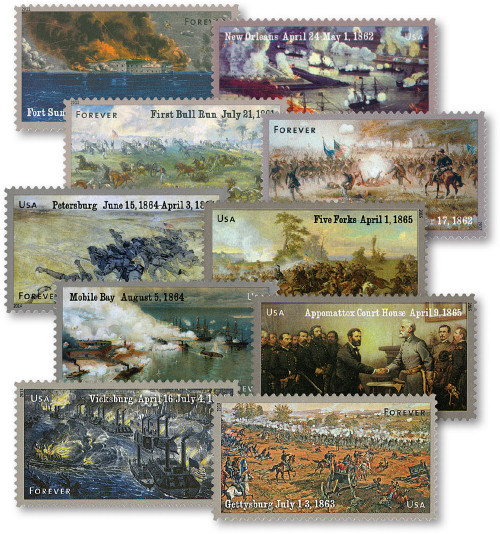
# 4522-23 - 2011 First-Class Forever Stamp - The Civil War Sesquicentennial, 1861
U.S. #4522-23
2011 44¢ Civil War Sesquicentennial
Issue Date: April 12, 2011
City: Charleston, SC
Quantity: 60,000,000
Printed By: Ashton Potter
Printing Method: Offset
Color: Multicolored
“Lee has arrived, and our hopes are high that we will wipe them clean out this time. Lee has an army great in numbers and spirit, and I believe he will wield it greatly. He is silent, inscrutable, strong, like a god.” – Lt. John H. Chamberlayne, Confederate Army
In 1861, years of heated rhetoric reached a climax and the nation spiraled into Civil War. An anti-slavery President occupied the White House, Kansas was admitted to the Union as a free state, and eleven states seceded from the Union. Men young and old were intoxicated by their desire to go to battle and eager to defend their principles.
As Civil War divided the nation, the South was further divided by neighboring states holding Union and Confederate loyalties. West Virginia emerged as a new Union state, although as in many regions, sympathies varied greatly from one town to another.
Union and Confederate armies assembled, often made of men with more passion than experience. Many officers were friends and former West Point classmates, including Confederate General Robert E. Lee and the opposing leaders at Fort Sumter.
While Fort Sumter marked the beginning of the conflict, the bloodshed at the First Battle of Bull Run made the nation face the somber reality of a lengthy war and the widespread suffering it would inflict.
The Trent Affair
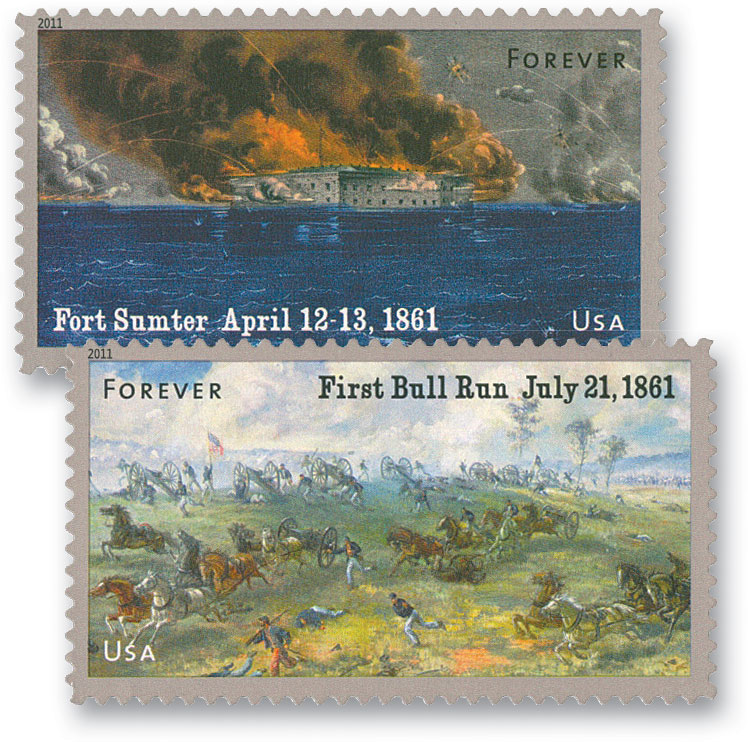
On November 8, 1861, the Trent Affair began an international incident that nearly sparked a war between the US and Great Britain during the Civil War.
As America moved toward war in early 1861, the North and South both considered what role the British might play in a potential future conflict. Britain depended on Southern cotton, so the South believed that would aid them in earning diplomatic recognition. However, the Union saw the conflict as an internal issue that the British should stay away from.
In February 1861, the Confederacy appointed a three-man delegation to travel to Europe to explain the Southern cause, open diplomatic relations, and “negotiate treaties of friendship, commerce, and navigation.” Much of their argument centered on states’ rights, the right of secession, and the importance of cotton. The delegation met with British representatives that May. Word of the Battle of Fort Sumter had just reached London, so the outbreak of open warfare wasn’t discussed at the meeting.
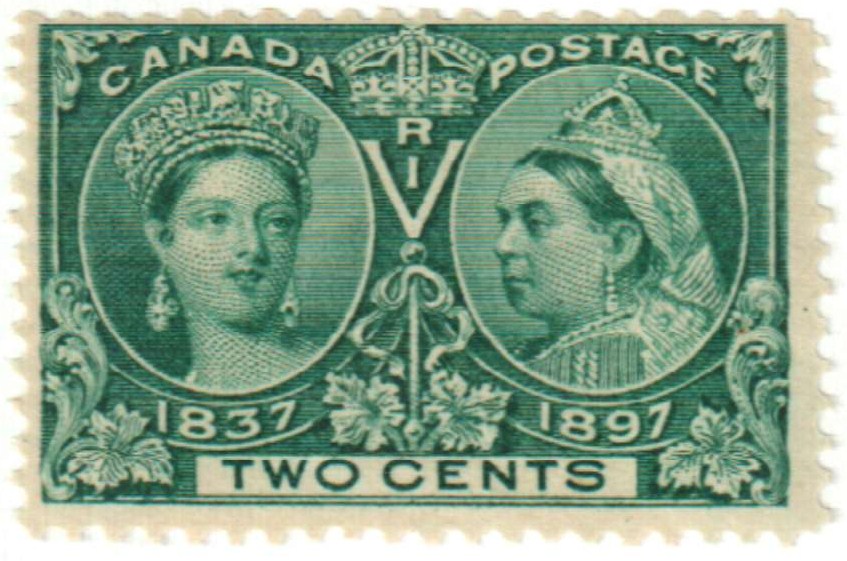
The British considered the Southerners’ argument, and then on May 13, 1861, Queen Victoria declared neutrality in the conflict, which served as recognition of Southern belligerency. This gave Confederate ships the same privileges in foreign ports that US ships had – they could get fuel and supplies, but not military equipment or weapons. France, Spain, the Netherlands, and Brazil soon made the same declarations.
The American diplomat in England was outraged, claiming that this declaration of neutrality was the first step toward diplomatic recognition. Secretary of State William H. Seward exclaimed that formal recognition of the Confederacy would make Britain an enemy of the US.
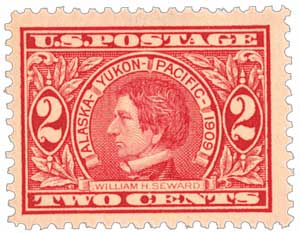
After the Confederates won the First Battle of Bull Run, the British believed that Confederate independence was inevitable, but they still planned to stay out of the internal conflict unless “the fortune of arms or the more peaceful mode of negotiation shall have determined the respective positions of the two belligerents.”
The Southern secretary of state grew impatient and decided to send his own diplomats to Britain and France, John Slidell and James Mason. The Confederates considered several options to get their diplomats over to Europe, having to get through Union blockades. They decided to charter the steamer Gordon, which could outrun Union ships. Renamed Theodora, it left Charleston, South Carolina, at 1 am on October 12 and slipped through the Union blockade. They made their way to Cuba, where they would board the British RMS Trent after it arrived in three weeks.
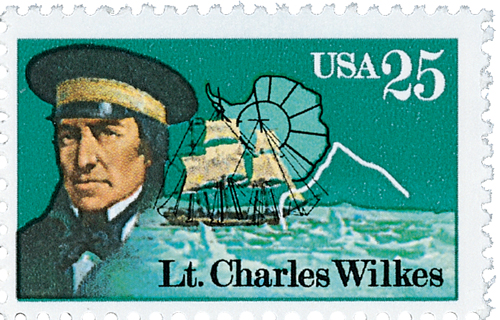
Back in the US, the Union government knew they South was sending diplomats to Europe but didn’t know which ship they left on. For a time, they believed it was the Nashville and sent a ship to Britain to pursue it. Eventually, Captain Charles Wilkes of the USS San Jacinto discovered the Confederate plan to board the Trent in Cuba. He stationed his ship near the Bahamas Channel, which they’d need to pass through, and waited.
On November 8, 1861, the Trent passed through the channel. Around noon, the San Jacinto fired two shots across the bow of the Trent, after which the British ship came to a halt. The Union sailors then boarded the Trent and took Mason, Slidell, and their secretaries prisoner. They reached America on November 15 and transferred the prisoners to Fort Warren in Boston.
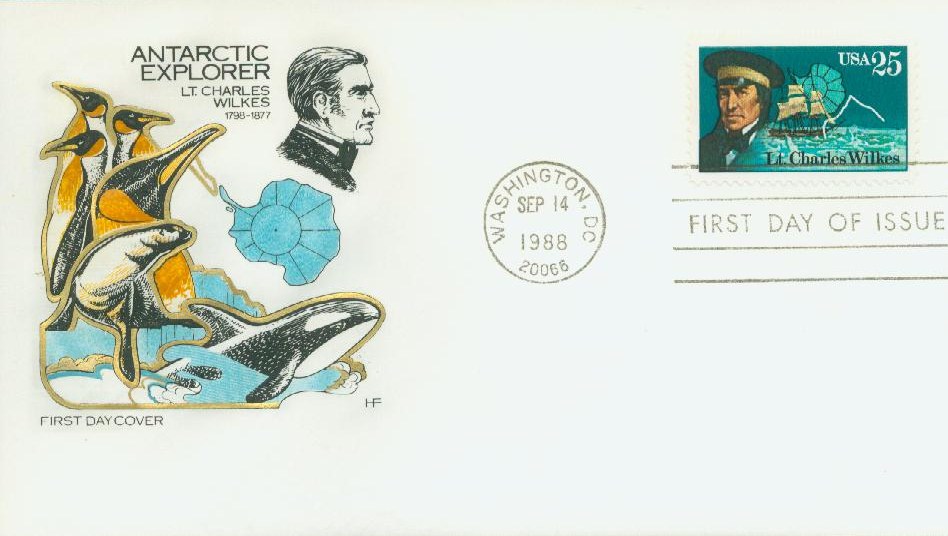
Though Northerners celebrated Wilkes’ actions, the British were outraged. They had not taken sides in the war and had a policy to accept any paying customer on their ships. The British demanded the men be released and the US issue an apology. They also began preparing for war – banning exports to America, sending troops to Canada, and planning several attacks. Additionally, France announced it would support Britain if war erupted.
Lincoln chose to avoid war with Britain and had a message sent to Britain condemning Wilkes’ actions. The men were released in January and finally made their journey to Europe. However, they failed to convince any European leaders to support the Confederate cause in the war.
U.S. #4522-23
2011 44¢ Civil War Sesquicentennial
Issue Date: April 12, 2011
City: Charleston, SC
Quantity: 60,000,000
Printed By: Ashton Potter
Printing Method: Offset
Color: Multicolored
“Lee has arrived, and our hopes are high that we will wipe them clean out this time. Lee has an army great in numbers and spirit, and I believe he will wield it greatly. He is silent, inscrutable, strong, like a god.” – Lt. John H. Chamberlayne, Confederate Army
In 1861, years of heated rhetoric reached a climax and the nation spiraled into Civil War. An anti-slavery President occupied the White House, Kansas was admitted to the Union as a free state, and eleven states seceded from the Union. Men young and old were intoxicated by their desire to go to battle and eager to defend their principles.
As Civil War divided the nation, the South was further divided by neighboring states holding Union and Confederate loyalties. West Virginia emerged as a new Union state, although as in many regions, sympathies varied greatly from one town to another.
Union and Confederate armies assembled, often made of men with more passion than experience. Many officers were friends and former West Point classmates, including Confederate General Robert E. Lee and the opposing leaders at Fort Sumter.
While Fort Sumter marked the beginning of the conflict, the bloodshed at the First Battle of Bull Run made the nation face the somber reality of a lengthy war and the widespread suffering it would inflict.
The Trent Affair

On November 8, 1861, the Trent Affair began an international incident that nearly sparked a war between the US and Great Britain during the Civil War.
As America moved toward war in early 1861, the North and South both considered what role the British might play in a potential future conflict. Britain depended on Southern cotton, so the South believed that would aid them in earning diplomatic recognition. However, the Union saw the conflict as an internal issue that the British should stay away from.
In February 1861, the Confederacy appointed a three-man delegation to travel to Europe to explain the Southern cause, open diplomatic relations, and “negotiate treaties of friendship, commerce, and navigation.” Much of their argument centered on states’ rights, the right of secession, and the importance of cotton. The delegation met with British representatives that May. Word of the Battle of Fort Sumter had just reached London, so the outbreak of open warfare wasn’t discussed at the meeting.

The British considered the Southerners’ argument, and then on May 13, 1861, Queen Victoria declared neutrality in the conflict, which served as recognition of Southern belligerency. This gave Confederate ships the same privileges in foreign ports that US ships had – they could get fuel and supplies, but not military equipment or weapons. France, Spain, the Netherlands, and Brazil soon made the same declarations.
The American diplomat in England was outraged, claiming that this declaration of neutrality was the first step toward diplomatic recognition. Secretary of State William H. Seward exclaimed that formal recognition of the Confederacy would make Britain an enemy of the US.

After the Confederates won the First Battle of Bull Run, the British believed that Confederate independence was inevitable, but they still planned to stay out of the internal conflict unless “the fortune of arms or the more peaceful mode of negotiation shall have determined the respective positions of the two belligerents.”
The Southern secretary of state grew impatient and decided to send his own diplomats to Britain and France, John Slidell and James Mason. The Confederates considered several options to get their diplomats over to Europe, having to get through Union blockades. They decided to charter the steamer Gordon, which could outrun Union ships. Renamed Theodora, it left Charleston, South Carolina, at 1 am on October 12 and slipped through the Union blockade. They made their way to Cuba, where they would board the British RMS Trent after it arrived in three weeks.

Back in the US, the Union government knew they South was sending diplomats to Europe but didn’t know which ship they left on. For a time, they believed it was the Nashville and sent a ship to Britain to pursue it. Eventually, Captain Charles Wilkes of the USS San Jacinto discovered the Confederate plan to board the Trent in Cuba. He stationed his ship near the Bahamas Channel, which they’d need to pass through, and waited.
On November 8, 1861, the Trent passed through the channel. Around noon, the San Jacinto fired two shots across the bow of the Trent, after which the British ship came to a halt. The Union sailors then boarded the Trent and took Mason, Slidell, and their secretaries prisoner. They reached America on November 15 and transferred the prisoners to Fort Warren in Boston.

Though Northerners celebrated Wilkes’ actions, the British were outraged. They had not taken sides in the war and had a policy to accept any paying customer on their ships. The British demanded the men be released and the US issue an apology. They also began preparing for war – banning exports to America, sending troops to Canada, and planning several attacks. Additionally, France announced it would support Britain if war erupted.
Lincoln chose to avoid war with Britain and had a message sent to Britain condemning Wilkes’ actions. The men were released in January and finally made their journey to Europe. However, they failed to convince any European leaders to support the Confederate cause in the war.













